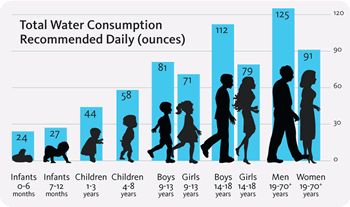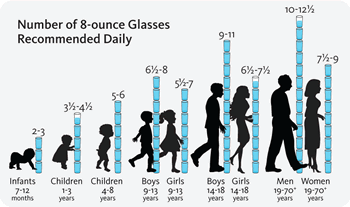Of course you're aware that water is essential to life, but like most folks you're probably curious about how much water you need to establish and maintain your good health and the good health of everyone else who depends on you for their water supply. There's the old "8 glasses of water a day" adage, and then the newer wisdom about drinking half your body weight in ounces of water a day. Which is correct? And how much do your kids need – surely it can't be the same as for you? Do you need to drink more if you're an athlete? And how do you know when to drink all that water, anyway?
Medical science weighs in with an answer
The U.S. Institute of Medicine recently provided the first research-based answer to your important question. The Institute's recommendations for water consumption are in the chart below and show the daily water intake levels that are adequate for healthy people, by age.
Total Water Consumption Recommended Daily (in ounces, 1 litre = 35 Ounces)

You'll notice that as you age, the volume of water recommended increases. And, no big surprise, there are different amounts recommended for males and females, starting at about age nine. That's because the water needs of each gender are slightly different across the life span, and males, on average, develop larger bodies (thus requiring more water).
Infants who are exclusively breast fed do not require supplemental water; as they grow and become less dependent on their mothers, however, a baby's need for healthy, clean drinking water increases.
Look closely at the Institute's recommendations and you'll notice that the amount of water your children require to sustain their growth nearly doubles in the first year of life.
But as we said, that chart doesn't show the whole story. Keep in mind that these recommended water intake amounts include the water you're getting from all sources. As a rule of thumb, the water in your food accounts for about one-fifth to one-third of your daily allotment. But this means good quality drinking water and other liquids must provide the remainder of your daily supply.
The following chart shows how many 8-ounce glasses of water (227 millilitres or 1 standard glass) you should drink daily to meet the Institute's recommendations. Remember that most of the glasses and cups used by adults and children today hold more than 8 ounces of liquid. It's a good idea to measure the actual capacity of the glass or other container you use for drinking water, and adjust your number of refills accordingly.
Number of 8-ounce Glasses Recommended Daily

A lot of research shows that water alone is the perfect nutritional choice at any age. But other liquids prepared with fresh, clean water – such as lemonade, coffee or tea – are also good ways for you and your family members to meet the daily requirement. Just make those drinks with the best water possible!
Balance your hydration and nutrition
Although nearly all consumable liquids have a high water content, a significant proportion of the beverages you and your children may enjoy the most – such as sweetened fruit juices, drink mixes and soft drinks – also contain large amounts of sugar or other undesirable ingredients that can add calories of limited nutritional value. Growing children, in particular, need to secure most of their calories from foods of high nutritional quality.
Water alone will satisfy your children's thirst and provide them with the hydration they need – without adding empty calories or reducing their hunger for good foods.
Every body has a built-in mechanism that signals when it's time to down another glass of water. It's called "thirst." Kids catch on right away that thirst is the body's natural way of requesting more water. The Institute of Medicine found that you will meet your daily water needs by drinking clean water whenever you feel thirsty.
Athletes, individuals who work in extremely hot environments, people who are ill, elderly individuals and infants are exceptions to this general rule. Their thirst mechanisms may not work as well or be inadequate to sustain healthy functioning.
If you're in one of these populations – or if your local temperature is consistently at or above 100 degrees farenheit or 37 degrees celsius – make sure you and anyone you're caring for drink enough water every day, even when thirst is absent.
Adequate water is not just important, it's essential
Scientists call water an essential element for life because all bodily functions require water, and the body cannot produce its own. If you drink enough pure, fresh water daily, you will give your body one of the most important building blocks it needs for healthy living.
These resources provide additional information about the recommended levels of hydration for individuals of different ages, genders and life circumstances:
Executive Summary of the National Institutes of Medicine Report: Dietary Reference Intakes for Water, Potassium, Sodium, Chloride, and Sulfate:
http://www.nap.edu/catalog/10925.html
The World Health Organization's report on water consumption:
http://www.who.int/water_sanitation_health/dwq/nutrientsindw.pdf
